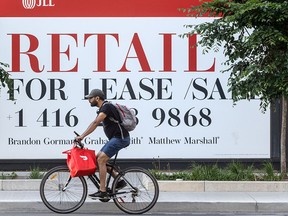Nearly 250,000 small businesses who received CEBA loans are in danger of shutting down, says CFIB
Article content
Business in the last year has been worse than it was during the pandemic for Tina Hamlin, who runs a home decor company in Vancouver. High interest rates and rising costs mean that people are more likely to spend on necessities rather than the high-end furniture or antiques that her 7,000-square-foot store sells.
Advertisement 2
Article content
In addition, Coast Consignment, which is often a source for design props used in movies, has been impacted by the ongoing Hollywood labour strikes, which she said has hurt about 25 per cent of her monthly sales.
Article content
Under current economic conditions, Hamlin doesn’t believe she can repay a government loan given to businesses in 2020 to tackle the impacts of the pandemic, though it is due by the end of this year.
“We have close to $15,000 to pay back. We can’t just come up with that money right now without taking on additional debt,” she said. “We are all struggling so badly that most of us are barely hanging on and it’s a very awful feeling.”

Nearly 250,000 other small businesses who received the Canadian Emergency Business Account (CEBA) loan are also in danger of shutting down because they aren’t in a position to meet the government’s deadline of repaying the loan by Dec. 31, 2023, the Canadian Federation of Independent Business (CFIB) said in June.
Advertisement 3
Article content
More than 40 per cent of the nearly 6,000 small businesses surveyed by CFIB risk missing the current repayment deadline, with businesses that have zero to four employees most likely to not be able to pay. Even among the 47 per cent who said they would be able to pay, half said they would struggle to do so, according to the survey by Canada’s largest association of small businesses.
Interest charges loom
The CEBA program offered interest-free loans of up to $60,000 to small businesses until June 2021. Repaying the loan by year-end would result in a loan forgiveness grant of up to $20,000. But companies that can’t meet the deadline will be charged interest of five per cent per year. In total, the program approved $49.2-billion worth of loans to around 900,000 businesses.
Article content
Advertisement 4
Article content
As the repayment deadline approaches, some of those business owners are looking to take on alternative loans to pay back CEBA, which could threaten the future of their businesses.
Jason Komendat, owner of Ottawa Bike Café, said he will have to use a line of credit to pay back the $40,000 he owes because of CEBA. This is in addition to the thousands of dollars he already owes because he’s behind on his rent and property tax.
He said he has begun to notice “pop ads” from “loan sharks” trying to take advantage of the situation. He was contacted by one such party online that said he was approved for a $17,000 loan, but the interest rate was around 20 per cent.
Komendat said he didn’t take the offer since he is fortunate enough to have a line of credit, but other businesses that are desperate might fall into such traps.
Advertisement 5
Article content
“The debt I have is not due to a lack of stewardship of the business,” he said. “It’s due to all these circumstances. If I had no debt right now, I feel like I would be in a good position.”

The owner of the downtown Ottawa café had rented a larger space just before the impacts of the pandemic started to take effect. He said his business has yet to see the demand it had prior to the pandemic and that the convoy protest that brought truckers into the downtown area was the “nail in the coffin.”
Despite all these disruptions, Komendat had to continue to pay the property tax and other regular payments, which was “extremely unfair,” he said.
“I have had counselling, not for my personal relationships, but for dealing with the business and the stress and waking up in the middle of the night with my gut twisting, for the last few years not knowing what’s the next move,” said the café owner who employs 12 people.
Advertisement 6
Article content
Rural regions hit harder
Some business owners said the deadline to pay back the loan is likely to have a worse impact on rural and remote businesses than urban ones.
Angela Pollak, chair of a business association in South Algonquin, Ont., a town located south of Algonquin Provincial Park with a population of about 1,000 people, said at least six anchor businesses are currently for sale.
“That’s a lot for a very small community,” said the owner of a ready-to-camp business.
Business owners in the town that’s heavily reliant on travellers for their earnings have watched revenue drop between 20 and 80 per cent on a year-over-year basis. Pollak said rising mortgage rates and gas prices mean that small vacations in scenic rural towns are off the table for a segment of the population.
Advertisement 7
Article content
“Our community seems like a ghost town during what is normally our busiest season of the year,” she said. “We will have businesses in our community closing their doors permanently if they must pay back the CEBA loan this year. They are penalizing rural places to a higher degree than the folks in the urban centres where there are more resources.”

As the deadline approaches, business associations have urged the government to extend the deadline for another two years. Not extending the deadline would suggest the government isn’t walking the talk when it comes to its statements about how important it believes small businesses are, Komendat and Hamlin said.
They said their businesses add more value to locals since the money they make goes back right into the Canadian economy, but they don’t get the support they deserve.
Advertisement 8
Article content
“We do not receive subsidies from the government in any form or way. We rent under commercial lease agreements that are extremely different from what people understand. We often are the ones who support little league teams,” Hamlin said.
“We just would like the government to show more support for small businesses and not just incredible subsidies and tax breaks for tax corporations that aren’t owned by Canadians.”
Komendat echoed a similar sentiment.
“The government says that we are the backbone of the economy, but I feel abandoned.”
• Email: nkarim@postmedia.com | Twitter: naimonthefield
Article content
Businesses warn of bankruptcy as CEBA deadline looms
2023-07-27 16:24:18






Comments
Postmedia is committed to maintaining a lively but civil forum for discussion and encourage all readers to share their views on our articles. Comments may take up to an hour for moderation before appearing on the site. We ask you to keep your comments relevant and respectful. We have enabled email notifications—you will now receive an email if you receive a reply to your comment, there is an update to a comment thread you follow or if a user you follow comments. Visit our Community Guidelines for more information and details on how to adjust your email settings.
Join the Conversation